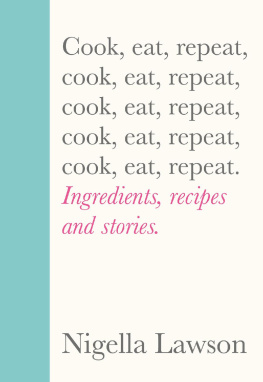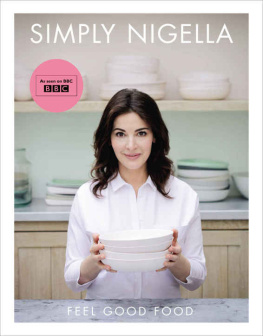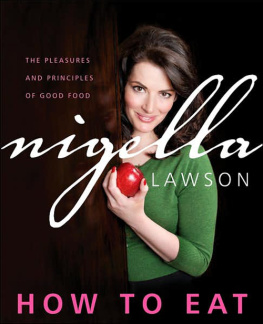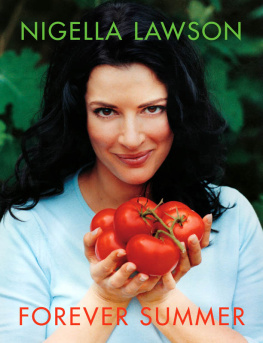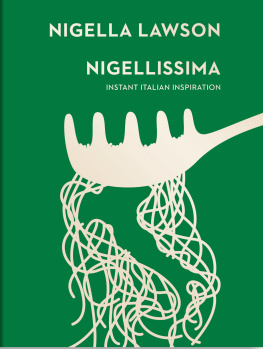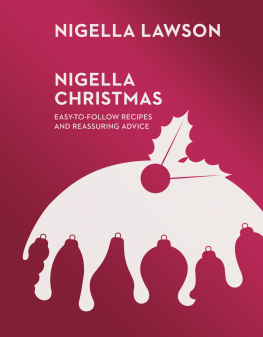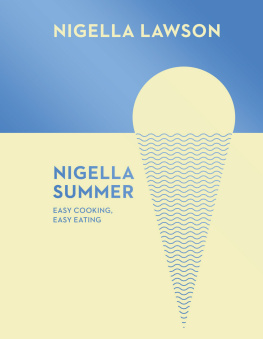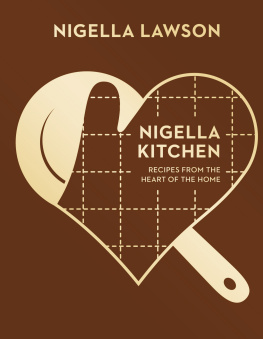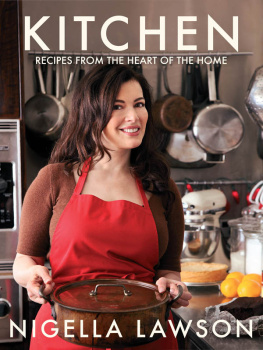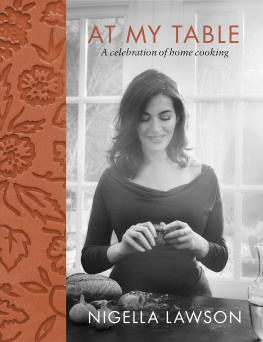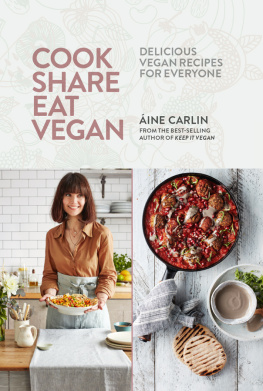Cook, Eat, Repeat
Ingredients, recipes and stories.
Nigella Lawson
CONTENTS
ABOUT THE AUTHOR
Nigella Lawson is an internationally renowned food writer and TV cook with eleven bestselling books to her name, including How to Eat and How to be a Domestic Goddess and, most recently, At My Table: A Celebration of Home Cooking . Several successful TV series have made hers a household name around the world.
ALSO BY NIGELLA LAWSON
HOW TO EAT
The pleasures and principles of good food
HOW TO BE A DOMESTIC GODDESS
Baking and the art of comfort cooking
NIGELLA BITES
Uncomplicated, fresh, perfect for everyday
NIGELLA SUMMER
Easy cooking, easy eating
FEAST
Food that celebrates life
NIGELLA EXPRESS
Good food fast
NIGELLA CHRISTMAS
Food, family, friends, festivities
NIGELLA KITCHEN
Recipes from the heart of the home
NIGELLISSIMA
Instant Italian inspiration
SIMPLY NIGELLA
Feel good food
AT MY TABLE
A celebration of home cooking
COOK, EAT, REPEAT
Cook, Eat, Repeat is a delicious and delightful combination of recipes intertwined with narrative essays about food, all written in Nigellas engaging and insightful prose. Whether asking What is a Recipe? or declaring death to the Guilty Pleasure, Nigellas wisdom about food and life comes to the fore, with tasty new recipes that readers will want to return to again and again.
The recipes I write come from my life, my home, says Nigella, and in this book she shares the rhythms and rituals of her kitchen through over 150 new recipes that make the most of her favourite ingredients. Dedicated chapters include A is for Anchovy (a celebration of the bacon of the sea), Rhubarb, A Loving Defence of Brown Food, a suitably expansive chapter devoted to family dinners, plus inspiration for vegan feasts, solo suppers and new ideas for Christmas.
Within these chapters are recipes for all seasons and tastes: Burnt Onion and Aubergine Dip; Butternut with Beetroot, Chilli and Ginger Sauce; Brown Butter Colcannon; Spaghetti with Chard and Anchovies; Chicken with Garlic Cream Sauce; Beef Cheeks with Port and Chestnuts; and Wide Noodles with Lamb in Aromatic Broth, to name a few. Those with a sweet tooth will delight in Rhubarb and Custard Trifle; Chocolate Peanut Butter Cake; Rice Pudding Cake; and Cherry and Almond Crumble.
C OOK, EAT, REPEAT : these words, the day-in, day-out, never-endingness of it all, no doubt sum up the Sisyphean drudgery of cooking for those who resent time spent at the stove. For those who, like me, find structure, meaning and an intense aliveness in the rhythms of the kitchen, they represent an essential liberating truth.
Cooking is not something you do, and then its finished with. It is a thread woven through our lives, encompassing memory, desire and sustenance, both physical and emotional. It can never be an end in itself. We return to dishes we love, not just because they mean something particular to us, but also because our hands feel comfortable preparing food that is familiar. Life is full of challenges not a bad thing in itself, of course and although there seems to be an ever-increasing amount of pressure to rise to the occasion of cooking something new and complex and unfamiliar (also, assuredly, not a bad thing), it becomes our food only when it eases its way into our repertoire, that list of dishes we return to and repeat, a list that grows and changes, to be sure, just as we grow and change.
But what seems essential to me, as a home cook, is that however many times we cook a recipe, and perhaps especially when we cook it so many times it ceases to feel like a recipe at all, we never exactly replicate it. In winter, pans will be colder than in summer, so cooking times will be different. That is, perhaps, a plodding example. But ingredients vary all the time, as do our moods, and if wed expect the former to make a difference, I have found over the years that it is no less true of the latter. When I test recipes and this is even the case with baking, where the precision required would seem to guarantee some degree of uniformity I am freshly astonished how each time there will be some small variation in either cooking process or outcome. I find freedom in this, and feel grateful that we who cook in our homes, as distinct from those who cook professionally in restaurants, do not have to be shackled by the creativity-draining need for consistency. Quite apart from the variables I have no control over a lesson in itself cooking at home in the normal run of things simply allows for less freighted experimentation.
But if my defence of repetition seems at odds with my championing of a less confining or conformist approach, I can assure you that it is this dynamic relationship between reliance on familiarity and curiosity about the as-yet-untried that underpins, perhaps even defines, what cooking is all about. For cooking, like life, in order to be manageable, enjoyable even, relies on both structure and spontaneity. We all need a framework, but we also have to know when to break free and just go with the flow. And this is something you learn as you go along.
If repetition sounds boring to you, rest assured I dont mean cooking the same recipes week in week out (although under the many pressures of everyday life, it is easy to fall into such a rut), but that cooking relies on many repeated actions that, added up, teach us ease in the kitchen, and help us acquire that instinct which too many perceive as being some innate gift.
It is precisely in those many mindless, mundane, repeated actions that cooking consists of, that allows it to be a means of decompression for so many of us. I have tried to meditate many times, and not always successfully; cooking might well be the nearest I can get to a meditative act. The routine busyness of all the peeling and chopping and stirring can be a balm for the buzzing brain. So many of the kitchen activities we might dread not because they are difficult but because they are monotonous peeling two kilos of potatoes, say are exactly what free us up, allowing us to relax or at least wind down a little. Of course, peeling a potato is not exactly mindless, but unless one has never peeled potatoes before, it is not something that requires hyper-vigilance. Its quietly absorbing. And as someone who is terminally fidgety, I am gratefully soothed by the many necessary low-level kitchen rituals that constitute cooking. Just enough focus is required to silence that chattering monkey-mind. Because one is doing something so familiar, so unthinkingly rehearsed, one isnt on high alert, but can let the senses touch, smell, sight, sound take over from intellect. Indeed, in all cooking one has to learn to let the senses take over: onions caramelising in a pan start sounding different as they cook; a cake in the oven smells suddenly more of itself when its ready. It takes practice to trust your senses, but essentially thats what cooking is: a practice, like doing yoga is a practice, and not a performance. Im not saying that the kitchen is always necessarily a zen place to be, but it can be a safe space for the frenetic soul.
Novice cooks shouldnt be daunted by my emphasis on the lessons taught by experience; we all have to start somewhere, and even if youre starting at the beginning, you soon learn how those small tasks and processes that you are obliged to do to get dinner on the table are transferable to the next, new recipes, as yet untried. For me, it is the essential repetitiveness of cooking that takes the pressure off. Its not now-or-never: every day, every meal, is another opportunity. And herein lies the particular joy of leftovers, when ingredients are repeated, reworked, to make something new and different. This is very much the province of the home cook, and it gives me pleasure, with many of these recipes, to suggest how they might be repurposed on another day or in different circumstances.

